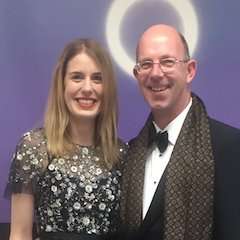Romeo and Juliet, Violetta and Alfredo, Mimì and Rodolfo, Floria and Mario, Tristan and Isolde… Does true love have to end in tears? Although we both like a good operatic farewell or even death, we accepted the challenge to deliver a musical Valentine’s Day card full of love and romance. It might not always end well for our operatic couples and Lieder poets, but they teach us one thing: love is like a butterfly, live in the moment and tell your loved ones how you feel! Not bad for two cynics, is it?!
1Puccini: “O soave fanciulla” (La bohème)
Christmas Eve. Boy meets girl. Girl asks for a light for her candle. Each tells the other a bit about themselves. It’s love at first sight. The duet from the end of Act 1 of Puccini’s La bohème tops the bill of our Valentine’s Day playlist and with good cause, especially when sung by Mirella Freni and Luciano Pavarotti. Yes, we know that Mimì’s already riddled with tuberculosis and that things won’t turn out well, but at the moment of that first encounter, things are looking pretty peachy. [Mark]
2Tchaikovsky: “Ya vas lyublyu” (Pique Dame)
As declarations of love go, Prince Yeletsky’s to his fiancée, Lisa, in The Queen of Spades is pretty perfect. Tchaikovsky’s long phrases are a gift for baritones, none more so than the great, much lamented Dmitri Hvorostovsky. We’ll draw a veil over the fact that Lisa spurns him and is attracted to bad boy, Hermann, instead, as I’m trying to suppress my natural cynicism here. [Mark]
3Clara Schumann: Liebst du um Schönheit
Both Gustav Mahler and Clara Schumann set one of Friedrich Rückert’s most wonderful and heart-melting poems: Don’t love me for beauty, don’t love me for youth, don’t love me for riches, but “If you love for love; Ah yes, love me!; Love me always; I shall love you ever more.” Is there a more genuine way to declare your love for someone? [Elisabeth]
4Prokofiev: Balcony Scene (Romeo and Juliet)
Is the Balcony Scene from Romeo and Juliet ballet’s most romantic moment? In Sir Kenneth MacMillan’s divine choreography, possibly so, especially when danced here with such ardour by The Royal Ballet’s Lauren Cuthbertson and Federico Bonelli. I’ve seen this ballet danced so many times, but even without the visuals, Prokofiev’s soaring violins never fail to move me. [Mark]
5 Puccini: “E lucevan le stelle” (Tosca)
Mario Cavarodossi is awaiting his execution at the Castel Sant’Angelo, but he isn’t filled with anger or rage. Instead he spends his last moments thinking of his beloved, her sweet kisses and languorous caresses and how she fell into his arms, never having loved life so much. Not the thought of death, but the thought of never seeing Tosca again stokes his despair. [Elisabeth]
6Verdi: “Già nella notte densa” (Otello)
The stars aren’t just shining over the Castel Sant’Angelo! The love duet from Verdi’s Otello takes place as night falls and Venus casts its spell over the newlyweds Otello and Desdemona. One of Verdi’s finest love duets, sung here by the incomparable Renata Tebaldi and Mario del Monaco. And just try and listen to those Vienna Phil cellos at the start without swooning... [Mark]
7 Wagner: Love Duet (Tristan und Isolde)
Tristan and Isolde are finally alone and have declared their eternal love and passion for each other. Whether it is the Liebestrank that cause Tristan and Isolde to fall in love or the fact that they both think it is a Todestrank, knowing that it’s consequence-free at that point, this duet is one of Wagner's most ecstatic eruptions. [Elisabeth]
8 Mahler: Andante moderato (Symphony no. 6 in A minor)
The Andante moderato of Mahler’s Sixth Symphony is often referred to as Gustav’s love letter to Alma. It is the point of rest after a relentless Scherzo, lush melodies (and cowbells) transporting you to the green and peaceful meadows of the alps. In her 1940 memoirs, Alma describes it as Gustav’s most personal work, “No other work came so directly from his heart as this one. We both cried… So deeply did we feel this music and what it foretold us.”, referring to the three “blows from fate” at the end of the last movement of the symphony. [Elisabeth]
9Berlioz: “Nuit d’ivresse” (Les Troyens)
After Otello and Desdemona and Tristan und Isolde, another nocturnal smooch occurs in Act 4 of Hector Berlioz’ epic grand opéra, Les Troyens. Trojan hero Aeneas has arrived in Carthage and fallen for Queen Dido. They sing a rapt love duet by the shore, beneath the stars, but the voice of Mercury calling “Italy!” is an ominous sign that Aeneas may not stick around for long… [Mark]
10Wolf: Wenn du mich mit den Augen streifst (Italian Songbook)
Anyone who’s been in love knows the feeling of your heart jumping out whenever you see your crush; the butterflies in your tummy, sometimes making it impossible to talk in straight sentences. In Wenn du mich mit den Augen streifst (part of Hugo Wolf’s Italian Songbook), the poet asks his lover to give him a sign before she smiles at him, “That I might restrain and tame my heart; when it would leap up for great love; That I might keep my heart in my breast; when it would break out for great joy”. Happy Valentine’s Day! [Elisabeth]
Valentine’s Day not working out for you? Try our cynics playlist instead.




